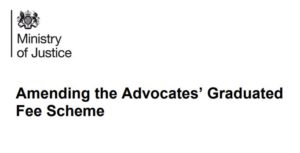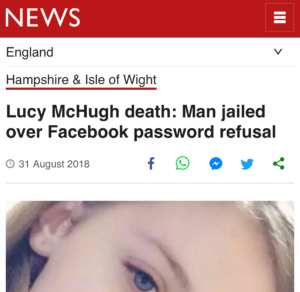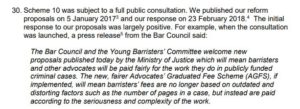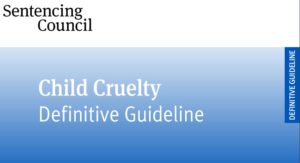Monthly Archives: September 2018

Where possible, VHS Fletchers is a solicitors’ firm committed to encouraging those interested in joining the legal profession. We welcome law students who are keen to find out what it is really like to be a criminal defence solicitor and legal aid lawyer.
Work placements can be hard to come by, but if you are local to one of our East Midlands offices then please contact us to see if we have space at one of them at a mutually convenient time.
VHS Fletchers are also keen to encourage those interested in joining the legal profession and welcome law students keen to find out what it is really like to be a Criminal Defence Solicitor. Work placements can be hard to come by so for those unable to secure a placement below is a description of Chesterfield partner and Crime Solicitor David Gittins typical week.
Monday
David was in the office early meeting Natalie the work placement student to show her the sort of work undertaken by a legal aid lawyer. They then walked over to Chesterfield Magistrates’ Court to represent a client who in the end failed to attend.
As a result, there was a lengthy wait before a warrant was issued, but David was able to use the time preparing for a later appointment to take instructions in relation to an upcoming trial.
It appears that the tone had been set for the day, and that client failed to keep his appointment.
David also undertook some preparation for his second appointment of the day. This again related to a forthcoming trial at Chesterfield Magistrates’ Court.
This was a particularly important appointment as the trial was listed before the court for a prosecution application to let the Magistrates’ know about his client’s previous convictions. David had hoped to discuss the convictions in detail to help him know how best to argue against the application.
This final client of the day also failed to attend his appointment.
Tuesday (day)
David was at Chesterfield Magistrates Court again on Tuesday. This time he was acting as court duty solicitor. This means that he would act as a legal aid lawyer for those defendants who hadn’t instructed a specific solicitor to act for them.
When David attended court he would not know the type of cases that he would be dealing with. In the end he represented two clients who had attended on bail and one in the cells.
He returned to court in the afternoon to complete all of the cases, including the representation of one defendant who had pleaded guilty to drink driving.
In between cases, David was able to discuss a case for the following day that needed the input of a consultant psychiatrist due to his client having difficulties with his mental health.
At the end of the normal working day, David saw a new client at the office who had been recommended to him. He was able to take instructions and submit a legal aid application online.
Tuesday (night)
That night David was on call as one of the lawyers staffing the firm’s out of hours police station rota to provide emergency advice and assistance to those being interviewed under caution by the police.
Although it would no doubt be preferable to interview suspects during normal working hours, the police often think it appropriate to interview at any hour of the night.
Although legal aid lawyer David only represented a single suspect during this period he travelled to Chesterfield police station at 8.45pm to represent his client who was accused of assault.
Free advice was provided and the client was released under investigation whilst the Police continued to investigate the offence.
David returned home shortly before 1 am but had to be back at his desk the following morning to complete that day’s work.

Wednesday (day)
David returned to Court on Wednesday morning to successfully resist the bad character application being made by the prosecution.
He also represented the client with mental health difficulties in their absence as they were not well enough to attend court. The case was adjourned to a future date.
On returning to the office David also spoke to the client that he had represented in the police station the previous night. Although we do not carry out family work he was able to signpost her to a family solicitor who could help with the issues arising following her arrest and release.
David returned to Chesterfield Magistrates’ Court for the afternoon session. He represented a client who was to be sentenced for a theft allegation. Unfortunately, due to the delays at court, this case was not called on until 4.30pm despite a bail time of 1.45pm.
Wednesday (night)
David was again involved with our out of hours rota. He was the coordinator for the scheme, which meant that he took the emergency calls from the Duty Solicitor Call Centre, police and clients or their families resulting from arrests.
Whilst David can complete this task from home with the use of his mobile phone, calls continue throughout the night. David deployed his colleagues to the police station at 9.30pm and a little after midnight.
A spare room is always helpful when coordinating the rota.
Thursday
David, suffering from a lack of sleep, was back at Chesterfield Magistrates’ Court at 9.30am to represent a client who had previously pleaded guilty to assaulting his partner. David successfully argued for a community order.
The rest of the day was spent by David completing work arising from cases he had dealt with that week and preparing files for future court dates.
Friday
David was again court duty solicitor at Chesterfield Magistrates’ Court. He dealt with a client who faced an allegation of unlawful possession of a firearm.
Saturday
Magistrates’ Courts across the country also sit on a Saturday morning to deal with defendants who have been refused bail by the police. Again we provide representation at these courts as part of our out of hours emergency rota.
David was represented two clients before Nottingham Magistrates’ Court. The first client faced a very serious allegation of possession with intent to supply cannabis as part of an organised crime gang. This client was remanded into custody having insufficient community ties to ensure attendance at future court dates for such a serious offence. David was assisted by a Lithuanian interpreter in this case.
The second case was at the other end of the spectrum in terms of seriousness, although it was serious to his client. David’s other client was simply charged with shop theft. However, what should have been a simple matter was delayed by the police as the client was not brought through to the cells until his methadone could be located, leading to a wait of several hours.
Considering becoming a legal aid lawyer?
We are currently advertising for the post of trainee solicitor at our Chesterfield office.
There are plenty of articles on our website that show you the kind of work that you will undertake both before and after qualification.
Read more in our news section.
A legal aid lawyer will only gain the experience necessary to provide expert advice in the field of criminal law by being part of a busy practise. We can offer that experience.
We look forward to hearing from you with either your request for work experience or application to be a trainee solicitor.
Monthly Archives: September 2018
The simple answer is no, you do not have to give the police your phone PIN.
There are, however, potential consequences in certain circumstances if you refuse.
When can the police ask for your phone PIN?
It is arguable that the police could ask you whenever they wanted for your phone PIN, you can always say no. The critical issue is whether they can take further action if you say no.
When can they take this further action?
Section 49 of the Regulation of Investigatory Powers Act 2000 contains the relevant power.
If your phone has been seized, or in circumstances where police have the power to inspect it, the police can give you notice that they require you to provide the phone PIN or “encryption key” to allow them access. The same applies to other devices such as computers.
Written permission must be obtained from a Judge or a District Judge for the giving of a notice under section 49, this then provides “appropriate permission”.
The person with “appropriate permission” requesting the information must believe, on reasonable grounds:
- that the key or PIN is in your possession;
- that the notice is necessary for the grounds listed below, or it is necessary for the purpose of securing the effective exercise or proper performance by any public authority of any statutory power or duty
- the notice is proportionate; and
- that it is not reasonably practicable for the person to obtain possession of the protected information without the giving of a notice.
A notice is ‘necessary’ if it is necessary:
- in the interests of national security;
- for the purpose of preventing or detecting crime or
- it is in the interests of the economic well-being of the UK.
What would “notice” be?
A notice has to be
- in writing (or otherwise recorded)
- set out the protected information to which it relates
- set out the grounds for requiring it
- specify the office, rank or position of the person giving it
- specify the office, rank or position of the person granting permission for it to be given
- specify the time by which the notice is to be complied with
- set out what disclosure is required and how it is to be provided.
What is concerning is that people are very often given documents that leave the impression that giving the phone PIN is compulsory, when in fact they are mere requests not authorised by any higher body.
As a result you should always seek the advice of a specialist criminal solicitor before complying with any request.
What if I do not know the PIN or still don’t want to give it?
If you do not comply with a properly given notice, you can be prosecuted. If you know the information required and refuse to provide it, you can be sentenced to a maximum of 2 years imprisonment or 5 years imprisonment for an offence involving national security or child indecency.
If you genuinely do not know the information you can put this forward as a defence to the offence.
The legislation says that a person will be taken as not being in possession of a key (or PIN) if “sufficient evidence of that fact is adduced to raise an issue with respect to it and the contrary is not proved beyond a reasonable doubt”.
What sentences have been given?
Andrew Garner failed to comply with a notice, he said that he had forgotten the PIN but was found guilty and given eighteen months imprisonment.
Tajan Spaulding pleaded guilty after refusing to provide the PIN for his iPhones and was given eight months imprisonment.
Stephen Nicholson was given 14 months imprisonment for failing to provide his Facebook password to the police during the investigation into the murder of Lucy McHugh.
How can we help?
People have been to prison for not providing the PIN for their phone, The consequences can be severe. This article can only ever be a simple overview of the power.
We can advise you whether the notice is lawfully made and whether the request is made in appropriate circumstances. We will advise you whether you have a defence that can be put forward in court.
If you have already been interviewed or face court proceedings we can still make a real difference to the outcome of your case. Legal aid may well be available to fund your defence at court.
We have offices across the East Midlands. You can find your most convenient office here. Alternatively you can contact us using the form below.

Contact
Monthly Archives: September 2018
Assaults on Emergency Workers
The penalties for assaults on emergency workers have been in the news recently.
Is there a specific offence covering assaults on emergency workers?
Until now the only specific offence has been that of assaulting a police officer. This is a summary only offence which carries a maximum of 6 months imprisonment.
There has always been an option to charge an offender with more serious offences, such as actual or grievous bodily harm, if the injury to the officer is more serious, and this will remain the case.
However, most lower level assaults on emergency workers have had to be charged as common assault – an offence carrying a maximum of 6 months imprisonment.
What is changing?
A new law has been passed which will create a new category of common assault – assaulting an emergency worker in the exercise of their functions.
If your neighbour was a police officer and you got into a dispute and assaulted them, the new provisions would not be triggered as they would not at that time be acting as a police officer (‘in the exercise of their functions’), but if you assaulted a police officer while being arrested, the provisions would be triggered.
The Assault on Emergency Workers (Offences) Act 2018 came into force on 13 November 2018.
Who will this cover?
“emergency worker” means—
(a) a constable;
(b) a person (other than a constable) who has the powers of a constable or is otherwise employed for police purposes or is engaged to provide services for police purposes;
(c) a National Crime Agency officer;
(d) a prison officer;
(e) a person (other than a prison officer) employed or engaged to carry out functions in a custodial institution of a corresponding kind to those carried out by a prison officer;
(f) a prisoner custody officer, so far as relating to the exercise of escort functions;
(g) a custody officer, so far as relating to the exercise of escort functions;
(h) a person employed for the purposes of providing, or engaged to provide, fire services or fire and rescue services;
(i) a person employed for the purposes of providing, or engaged to provide, search services or rescue services (or both);
(j) a person employed for the purposes of providing, or engaged to provide—
(i) NHS health services, or
(ii) services in the support of the provision of NHS health services, and whose general activities in doing so involve face to face interaction with individuals receiving the services or with other members of the public.
It is immaterial whether the employment or engagement is paid or unpaid.
What is the penalty?
The maximum penalty will increase from 6 to 12 months’ imprisonment.
Is there any further effect?
The legislation will also create a statutory aggravating factor. This means that if a different offence is charged (such as actual bodily harm, for example) where the victim is an emergency worker, it will be seen as an aggravating factor which merits an increase in the sentence to be imposed.
Within the current sentencing guidelines, it is already an aggravating factor to assault a person serving the public, but the legislation will put the position on a statutory basis.
Why is this happening?
There has been an increase in assaults on emergency workers in recent years.
Government statistics reportedly show
- 26,000 assaults on police officers in the last year
- 17,000 on NHS staff
- an increase of 18% in assaults on firefighters in the previous 2 years
- a 70% increase on assault on prison officers in the 3 years up to 2017.
As a result of these increases, new legislation was proposed, and this will be the first time there is a specific offence extending protection to those carrying out the work of an emergency service.
Whether this sentence increase will deter assaults remains to be seen, with most commentators being sceptical at best.
How can we help?
Those facing allegations of assaults on emergency workers will always know that the court will treat these allegations seriously, with or without another piece of legislation.
If you are arrested or know that the police wish to speak to you about an offence of assault upon an emergency worker or any other allegation then make sure you insist on your right to free and independent legal advice.
The advantages of such early advice legal advice can be found here.
If you have already been interviewed or face court proceedings we can still make a real difference to the outcome of your case. Legal aid may well be available to fund your defence at court.
You can read about a case where we made representations causing the prosecution to drop a case here.
We have offices across the East Midlands. You can find your most convenient office here. Alternatively you can contact us using the form below.

Contact
Monthly Archives: September 2018
Monkey Dust – The cannibal drug that makes you smell of vinegar and prawns
What are you talking about?
Monkey dust is a synthetic drug, a type of new psychoactive substance. It is similar to other cathinone drugs such as MDPV, methylone and magic crystals.
In the USA it is known as “Zombie Dust” or “Cannibal Dust” due to one of the reported effects of the drug being users trying to eat their own face.
I’ve never heard of it?
The drug has been around for a while and was formerly one of the drugs referred to as “legal highs”.
In recent months, it has started to become more prevalent in some areas of the country and, undoubtedly, the use of it will spread.
In the Midlands, there have been news reports of people climbing buildings and trees and running into traffic while under the influence and attacking people who approach them.
What does it look like?
The drug is a white powder.
What are the effects?
It is a psychoactive substance with effects similar to PCP such as high body temperature, paranoia, agitation and hallucination; it can also make users impervious to pain. Frequently users have no recollection of their behaviour while under the influence of the drug.
Heavy users have reported the appearance of lesions on the skin and a smell of prawns or vinegar from their sweat.
Lecturers from Staffordshire University, Sarah Page and Em Temple-Malt spoke with people in Stoke-on-Trent about the use of NPS. One user said that he had been arrested for a breach of the peace after “arguing with a garden gnome”.
Although amusing, it demonstrates the irrational behaviour that can take place while under the influence, the drug is said to be “worse than spice” and can cause extreme violent behaviour.
Is it illegal?
Yes.
Monkey Dust is a Class B drug.
This means that it is illegal to possess and also to sell, give away or possess with intent to supply it. Possession can result in up to 5 years imprisonment while supply offences carry up to 14 years imprisonment.
You can read more about the law and penalties in relation to the supply of drugs here.
How can we help?
If you are arrested or know that the police wish to speak to you about an offence of supplying drugs then make sure you insist on your right to free and independent legal advice.
The advantages of such early advice legal advice can be found here.
If you have already been interviewed or face court proceedings we can still make a real difference to the outcome of your case. Legal aid may well be available to fund your defence at court.
We have offices across the East Midlands. You can find your most convenient office here. Alternatively you can contact us using the form below.

Contact
Monthly Archives: September 2018
 We have prepared our response to the latest Government consultation on legal aid funding entitled Amending the Advocates’ Graduated Fee Scheme. This time the Ministry of Justice wishes assistance on how to spend what is described as £15m of ‘new’ money on fee payments for those undertaking Crown Court advocacy.
We have prepared our response to the latest Government consultation on legal aid funding entitled Amending the Advocates’ Graduated Fee Scheme. This time the Ministry of Justice wishes assistance on how to spend what is described as £15m of ‘new’ money on fee payments for those undertaking Crown Court advocacy.
It is optimistically hoped that the proposed fee scheme will attract suitable candidates to both the Bar and solicitors’ profession.
Unfortunately it seems unlikely that these proposals address these aspirations once the fee structure is looked at in detail.
For example, this view expressed within the consultation document is in conflict with the aim of properly funding those entering the profession.
Surely this paragraph ought to be acknowledging the damage to the junior end of the profession by choosing this as a priority? Instead it trumpets redistribution of existing funds to the cases that more senior counsel undertake?
We wonder if anyone involved in the initial negotiation, particularly the Young Barristers Committee, is regretting expressing this opinion by now?
The consultation document seems to express a genuine interest in the views of the profession. As a result there may be every reason to engage with the consultation. It is hoped that organisations such as the Law Society, CLSA and SAHCA will be making strong arguments on behalf of the solicitors’ profession as a whole and preparing responses detailing the realities of the fee cuts.
Having said that, we also approach the consultation with a certain amount of cynicism. The last two substantial consultations have resulted in Judicial Review proceedings when the government ignored the opinions proffered.
The Ministry has pledged a review of the current scheme. It is hope that this isn’t the same level of commitment that the government has shown in relation to its review of LASPO. We still wait for that to be concluded while people continue to be excluded from the legal aid scheme.
We have a number of concerns about the fee scheme in its entirety. If fails to reward those at the beginning of their careers and then penalises specialist advocates later in their career who deal with complex cases with a high page count.
It represents a significant cut in fees for many types of case and will not assist with in preserving the future of criminal advocacy.
Our response to the consultation on amending the Advocates’ Graduated Fee Scheme
The Law Society response can be found here.
The Criminal Bar Association response can be found here.
Monthly Archives: September 2018
Fly on the wall documentaries are increasingly popular, particularly when they show the workings of the criminal justice system. Such programs may, particularly when they rely on interviews with the police, present a no comment interview as harmful to a suspects case.
While there may be instances where a person is not helped by failing to give an account, there are many occasions when there is substantial benefit to a no comment interview.
Exercising your right to silence
Choosing not to answer questions is your legal right. The reasons for refusing to answer questions my be complex. You would certainly be best advised to seek expert legal advice before doing so.
You can read more about your right to silence here.
Choosing a no comment interview might mean that no further action is taken by the police at the conclusion of the police investigation.
Here are two examples where accredited police station representative Rob Lowe at our Chesterfield office provided advice on the right to silence. His clients conducted a no comment interview. Ultimately it was to their benefit.
No comment interview following assault allegation

Rob was instructed to attend for a voluntary interview. His client was being investigated as an allegation had been made that he assaulted a neighbour. The neighbour was said to have stepped onto his land to remonstrate with a third party who was driving a tractor.
The allegation was that Rob’s client had then shoved the neighbour.
Upon taking his client’s instructions, he confirmed that he had been present and approached the complaint. He accepted putting himself between the complainant and the driver. This was to highlight to the neighbour that he was putting himself in a dangerous position bearing in mind the type of vehicle.
Our client denied touching the complainant at all.
Rob assessed the police evidence as being weak. Without any form of admission it seemed unlikely that it would proceed to court. In order to remove any risk that his client would go beyond his instructions when interviewed, Rob advised his client to use a prepared statement and then conduct a no comment interview.
Rob’s assessment of the case was correct because after the interview took place the police confirmed that no further action would be taken.
No comment interview where no complaint made
On this occasion following a client’s arrest, Rob was instructed to advise a suspect who had been arrested of assault and criminal damage within a domestic setting.
Before interview, Rob discovered that the police had no statement of complainant from the only witness who could support a prosecution. There was no other admissable or independent evidence.
Based on his assessment of the evidence, Rob advised his client that he ought to exercise his right to silence in interview. As a result, he made no comment replies to questions.
As no one was accusing his client of wrong doing there was no need to answer questions. Again, Rob’s client was released without any charges from the police.
Instruct a criminal law specialist to advise on a no comment interview.
These are just two examples of how instructing us at the point of police interview can benefit you and ensure that we protect your interests.
Some more benefits of early legal advice can be found here.
We have offices across the East Midlands. You can find your most convenient office here. Alternatively you can contact us using the form below.

Contact
Monthly Archives: September 2018
Who is Ben Stokes?
Ben Stokes is the England cricketer who was charged with affray and acquitted by a jury.
But the video showed him hitting someone?
It did, his defence was that he was acting in self-defence, you can hit someone and still be not guilty of an offence in certain circumstances.
Why did the Crown Prosecution Service (CPS) charge him then?
It is not for the CPS to decide whether or not a person is guilty, its role is to assess whether there is a reasonable prospect of conviction, if there is sufficient evidence to proceed and it is in the public interest to do so.
In this case, the issue was for the court or jury to decide whether or not he was acting in self-defence or of another.
How does a jury make their decision?
Jurors are not allowed to discuss their deliberations with anyone outside of the jury room, so we can never know what discussions took place.
You can read more about how jury trials work here.
The Judge provided them with a “route to verdict” document which sets out the questions that the jury needed to ask themselves before coming to a verdict.
What was the “route to verdict”?
- Did Ben Stokes use, or threaten violence towards another? If no, not guilty, if yes move to the next question.
- Did he genuinely believe that it was necessary to use or threaten that violence so as to defend himself and/or another?
- If yes, was the force reasonable in the circumstances he perceived them to be? If it was, then the verdict is not guilty.
- If no, move to the next question.
- Was the conduct of all of them, taken together, such as would cause a person of reasonable firmness present at the scene to fear for his personal safety? If yes, the verdict is guilty, if no or it may not have been, the verdict is not guilty.
What is reasonable?
The jury was given further guidance that only the use of reasonable force can be lawful.
A person who genuinely thinks he or another is about to be attacked may react on the spur of the moment. He cannot realistically be expected to weigh up precisely how much force he needs to use to defence himself or that other person.
If he has done what he honestly and instinctively thought was necessary, then that would be strong evidence that it was reasonable. On the other hand, using force out of all proportion to what he genuinely anticipated might happen to him or another, then that would be unreasonable.
How can our expert criminal solicitors help?
We will be able to give you advice as to the strength of the evidence in public order offences, the availability of defences and likely sentence upon conviction. You will always be helped by seeking this advice at the earliest possible opportunity.
As a result, if you are arrested for a public order offence or know that the police wish to speak to you about an offence of then make sure you insist on your right to free and independent legal advice.
The advantages of such early advice legal advice can be found here.
If you have already been interviewed or face court proceedings we can still make a real difference to the outcome of your case.
Legal aid may well be available to fund your defence at court.
We have offices across the East Midlands. You can find your most convenient office here. Alternatively you can contact us using the form below.

In this case, Ben Stokes elected to be dealt with at the Crown Court rather than the Magistrates’ Court, we can advise you on the options available to you and the consequences of those options.
Contact
Monthly Archives: September 2018
The Sentencing Council has published a new guideline for how those guilty of child cruelty offences should be sentenced. It covers three offences:
- cruelty to a child;
- causing or allowing a child to die or suffer serious physical harm; and
- failing to protect a girl from the risk of female genital mutilation (FGM).
Sentencing Council member Mrs Justice Maura McGowan said:
“Child cruelty offences vary greatly. They can range from a one-off lapse of care which puts a child at risk of harm to a campaign of deliberate cruelty which leads to serious injury or even death. This new guideline will help ensure sentences that reflect what the offender has done and the harm to the child. It states for example that cases involving very significant force, or multiple incidents of serious cruelty should always be treated as being in the highest category of culpability. The guideline will also assist sentencers in cases where the offender has also been the victim of abuse from another.”
When does the guideline come in to force?
The sentencing guideline for child cruelty offences applies to all cases sentenced on or after 1 January 2019. This means that cases charged before that date may be affected by the changes if there is to be a sentence after that date.
Does it apply to all offences of causing harm to a child?
No, it doesn’t.
When someone is prosecuted for harming a child, the offence charged will vary according to the circumstances. It is important to distinguish the offences in this guideline from other offences that may be charged, such as assault, murder and manslaughter.
There are also cases in which a child is harmed and one person is charged with assault and another with allowing the child to suffer serious physical harm.
Publication of the guideline marks the first time that there has been sentencing guidance for the offences of causing or allowing a child to die or suffer serious physical harm and failing to protect a girl from the risk of FGM.
The sentencing guideline also provides revised guidance for the offence of cruelty to a child. This replaces the earlier guidance issued in 2008.
Child cruelty offences are complex and can vary greatly. As a result the guideline has been designed to assist with an effective assessment of each case that comes before the courts to help ensure consistent and proportionate sentencing.
Some offenders may be incompetent parents, while others may deliberately inflict harm on children in their care. Child cruelty offences could include parents or guardians leaving children home alone, neglecting them or putting them at risk through alcohol or drug abuse or subjecting them to sustained and deliberate ill-treatment and violence that leads to serious injury or death.
Offences can also involve a parent or guardian having failed to act to protect their child from ill-treatment by someone else in the household, which can be due to them being victims of violence and intimidation from the same person themselves.
Is there anything new in the approach to sentencing?
In assessing harm to victims, as well as physical and psychological harm, the guidelines for child cruelty offences take into account for the first time the developmental and/or emotional harm that such offences can cause to a victim. This may for example be manifested in developmental milestones that a child has not met.
The guidelines also introduce a new aggravating factor of an offender blaming others for an offence. This is because such cases will frequently involve one parent or carer/guardian seeking to blame the other for what happened in order to avoid prosecution.
Another factor that has been added that indicates high culpability is where the “offender [has] professional responsibility for the victim” to indicate that culpability is higher in those rare cases where, for example a teacher or sports coach abuses one of the children in their care.
The guidelines also contain, for the first time, additional guidance for the court in considering whether to impose custody in cases where the offender has parental responsibility and is sole or primary carer for the victim and other children.
In these cases, the court is reminded to consider the impact which a custodial sentence for the offender would have on the victim and whether this is proportionate to the seriousness of the offence. This will be particularly relevant in lower culpability cases where the offender has otherwise been a loving and capable parent or carer.
Cruelty to a child
The offence of cruelty to a child is broad in its form and severity. Cases may be sentenced in the magistrates’ courts or Crown Court and involve ill-treatment and assault, neglect, abandonment, and failure to protect a child.
In the vast majority of cases the offender is usually the parent or guardian of the victim but it could apply to others entrusted with the care of a child. Many of these offences are at the lower end of severity, including low levels of neglect and cases where there is a risk of harm but no harm actually comes to the child.
The new guideline sets out proportionate sentencing levels to cover the wide range of situations that the courts deal with. One offence could involve someone who is an otherwise good parent putting a child at risk through a one-off lapse of care, while another could involve a parent guilty of a campaign of cruelty involving serious violence and sadistic behaviour that leads to a child suffering serious physical or psychological harm.
Causing or allowing a child to die or suffer serious physical harm
The main purpose of the legislation for this offence is that it can be prosecuted in instances where a child has died or suffered serious physical harm as a result of an unlawful act, such as an assault, by a member of the household but there is not enough evidence to prove which of the defendants committed the act. They may both blame each other.
In such cases before the introduction of this legislation, neither defendant could be found guilty of murder, manslaughter or assault and so nobody would be held accountable. The guideline reflects the aims of the legislation, including for example the aggravating factor of an offender blaming others for the offence.
This offence can also be used in its own right, for example if someone in the household is charged with the murder or manslaughter of a child, another member may be convicted of causing/allowing death, if it can be proved that they foresaw, or should have foreseen, that their co-defendant would commit an unlawful act which risked serious physical harm to the child.
There are very low volumes of offenders sentenced for this offence, due to the fact that where a child has been killed, those responsible are likely to be charged with murder or manslaughter, and where the child was badly injured, a serious assault charge would normally be brought.
Failing to protect a girl from the risk of Female Genital Mutilation
This offence is committed when a parent or carer of a girl under 16 allows FGM to take place unless they can show that they were not aware of such a risk and reasonably could not have been expected to be, or that they took reasonable steps in order to protect the girl.
The issue of FGM has been of growing concern within Parliament and the public and so the Council is keen to provide a clear approach to ensure consistent and appropriate sentencing when offenders are convicted.
The guideline takes into account the psychological impact these offences can have on victims and acknowledges that by their very nature, all offences of FGM carry an inherent level of harm.
The full sentencing guideline for child cruelty offences can be found here.
How our criminal law solicitors can help defend child cruelty offences
We will be able to give you advice as to the strength of the evidence in child cruelty offences, the availability of defences and likely sentence upon conviction. You will always be helped by seeking this advice at the earliest possible opportunity.
As a result, if you are arrested or know that the police wish to speak to you about an offence of then make sure you insist on your right to free and independent legal advice.
The advantages of such early advice legal advice can be found here.
If you have already been interviewed or face court proceedings we can still make a real difference to the outcome of your case.
Legal aid may well be available to fund your defence at court.
We have offices across the East Midlands. You can find your most convenient office here. Alternatively you can contact us using the form below.

Contact
Monthly Archives: September 2018
We have previously written about the increase in prosecutions over recent years where there is no statement from the alleged victim in the case. The victim might not be supporting the prosecution or may even be unknown. This will lead to arguments over the admissability of evidence.
The reasoning is that even though a victim is unwilling to assist the Prosecution, a person should not be able to avoid responsibility for offending that they have committed. Of course, there are a number of risks to proceeding without evidence from the person who ought to know best what, if anything, happened.
Prosecution rely on principle of Res Gestae
In order to present such cases the prosecution will often rely on a rule of evidence called Res Gestae. This allows hearsay evidence that would usually not be allowed in court to be used as admissable evidence.
You can read more about this rule of evidence here.
Unfortunately we have noted that the prosecution seek to rely on this exception to the usual rules of evidence in a number of cases where it doesn’t apply.
As a result it is vital to have an experienced solicitor who is able to argue your case in Court to try and avoid this from taking place.
Recent case defended by Chesterfield crime solicitor
Chesterfield Crime Solicitor Kevin Tomlinson was recently presented with such a scenario. His experience told him that the prosecution was trying to admit evidence in circumstances where it was not admissible.
His skill and expertise as an advocate persuaded the Magistrates that he was right. The evidence was ruled inadmissible and his client was found not guilty.
Domestic violence allegations
Kevin’s client faced charges of common assault and criminal damage within a domestic setting. Police officers attended the alleged victim who gave an account implicating stating that our client was responsible for the offending.
She alleged that he had been aggressive and threatening towards her when she returned home with a friend after a night out. After the friend left he had then assaulted her in the bedroom and caused damage to a wall and perfume bottle.
The police had obtained a recording of the 999 call. The initial complaint had also been recorded on police bodycam footage. Finally she made a written witness statement. Here friend had also made a statement describing our client’s behaviour before she left.
During the course of the investigation, the complainant had provided a further statement stating that she no longer supported the prosecution and wished to withdraw her complaint.
From the outset of the case our client had set out a defence. He told the police that he had not done what was alleged against him and was therefore not guilty of the offences.
Key witness did not attend the trial
In light of the later statement taken from the complainant it was not surprising that the complainant failed to attend Court for the trial. The supporting witness also failed to attend.
Despite this, the prosecutor informed Kevin that they wished to proceed with the case. They intended to use the account provided by the complainant in the 999 call as well as what she told the police upon their arrival. The reasoning was that this evidence would be admissable using res gestae.
Kevin argued against the admissability of evidence relating to these allegations. The key requirement, that the witness was so overcome with circumstances of the situation that she could not have made the allegations up, did not exist in this case. She was calm during both the call and the conversation. The assertion that the allegation could not have been made up did not stand up to scrutiny.
Additionally, Kevin was able to argue that instead of trying to admit evidence in this way the prosecution, who had known for weeks that the witness did not intend to attend Court, should have taken the appropriate steps to have her there. The doctrine of Res Gestae should not be used to avoid calling witnesses as it prevents the prosecution challenging the evidence.
Not guilty verdict after trial
Kevin’s argument found favour with the Court who refused the Crown’s application meaning the Prosecution had no option but to offer no evidence against Kevin’s client.
This case highlights the importance of instructing a solicitor. It is important that you do not rely on a solicitor appointed by the court as their responsibilities to you in your case are limited.
Had the defendant in this case been unrepresented it might be unlikely that they would effectively challenge the admissability of evidence of this nature and the outcome could have been very different.
Instruct an solicitor who is an expert in the admissability of evidence.
Criminal trials will always feature a certain level of complexity. The best way to prepare for trial is to seek legal advice at the earliest possible moment.
If you are arrested or know that the police wish to speak to you about an offence of then make sure you insist on your right to free and independent legal advice.
The advantages of such early advice legal advice can be found here.
If you have already been interviewed or face court proceedings we can still make a real difference to the outcome of your case. Legal aid may well be available to fund your defence at court.
A further example of a successful argument against the admissability of evidence can be found here.
We have offices across the East Midlands. You can find your most convenient office here. Alternatively you can contact us using the form below.

Contact
Monthly Archives: September 2018
Agent provocateur is French for “inciting agent”, an entrapment situation where a person is enticed, incited or encouraged into committing an offence that he would not have otherwise committed.
How does it relate to criminal law?
The police frequently use undercover police officers in relation to drugs offences. An officer becomes familiar with local drug users and suppliers, and evidence for supply-related offending is obtained.
If the officer asks the suspect for drugs is he an agent provocateur, is he an “inciting agent”?
Some people would try to argue he is and that they wouldn’t have committed the offence unless he had asked them. The difference is between the officer causing the offending and merely providing an opportunity for it to be committed with the officer rather than someone else.
What have the courts said, and is entrapment a defence?
Entrapment is not a defence, but it could be argued that the case should not be brought at all.
This would involve a consideration as to the degree of persuasion, the gravity of the offence. The question of exclusion of evidence may also arise.
In the case of Shannon it was said that if there is good reason to question the credibility of the evidence given, then the judge may conclude that the evidence should be excluded.
Two leading cases involved the supply of drugs to an undercover police officer. “L” argued that he had been lured into the supply.
The Court held that it would be acceptable if officers were to provide a person with an unexceptional opportunity to commit a crime and the person then freely took advantage of that opportunity.
The situation would be quite different and would be an abuse of process if officers instigated an offence by offering inducements and luring a person into a course of action he would not normally have followed.
In “G’s” case the actions of the officers, by contrast, were said to go beyond those of undercover agents as they instigated the offence, there was no evidence to suggest that without their intervention it would have been committed.
In a case involving an undercover journalist (Shannon v UK), it was said that an offender was not entrapped when he supplied drugs to the journalist as he had not been placed under any pressure to do so.
Do undercover officers have rules to follow?
There is an Undercover Operations Code of Practice issued jointly by all UK police authorities and HM Customs and Excise.
Contact one of our criminal law solicitors to discuss issues of entrapment.
We are experts at assessing evidence and putting forward legal arguments. We can advise you as to whether entrapment applies to your case or not.
As a result, if you are arrested or know that the police wish to speak to you about an offence of then make sure you insist on your right to free and independent legal advice.
The advantages of such early advice legal advice can be found here.
If you have already been interviewed or face court proceedings we can still make a real difference to the outcome of your case. Legal aid may well be available to fund your defence at court.
We have offices across the East Midlands. You can find your most convenient office here. Alternatively you can contact us using the form below.











